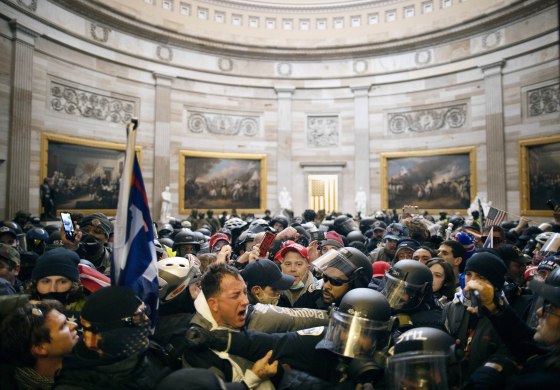WASHINGTON — Momentum has dissipated for the creation of a 9/11-style commission to study the Jan. 6 attack on the Capitol, jeopardizing efforts to launch a bipartisan and comprehensive examination of what took place that day.
Lawmakers are growing increasingly pessimistic that an agreement on establishing such a commission can be reached. Congressional leaders remain deadlocked on the scope and makeup of the panel, with Democrats continuing to insist that they should have more seats on it. And unlike after the 9/11 terrorist attacks, when Congress united, the distrust between the two parties in the aftermath of the riot has only grown in the intervening months.
“My instinct is that it is not happening,” said Sen. Roy Blunt of Missouri, a member of Republican leadership and close ally of Senate Minority Leader Mitch McConnell of Kentucky.
Private discussions between party leaders have been stalemated for weeks, aides say.
Republicans balked at House Speaker Nancy Pelosi’s initial proposal that President Joe Biden name three people to the panel and each of the four congressional leaders name two, likely giving Democrats seven seats and Republicans four seats.
McConnell has also objected to the scope, saying that if Pelosi wants to look at extremist groups involved in the attack, like the Oath Keepers and Proud Boys, then the commission should also study other extremists who were not involved in the attack, like antifa. Pelosi adamantly disagrees.
“The main problem is the scope of the investigation,” Pelosi said Wednesday on MSNBC’s "Morning Joe." “We want it to be bipartisan.”
Neither side appears willing to relent.
House Republican Leader Kevin McCarthy of California on Thursday called Pelosi’s proposal a “partisan play.”
“I think the path forward is very easy,” McCarthy said, calling for an equal number of Republican- and Democratic-appointed seats. “Unfortunately, the only person who's opposing that is Speaker Pelosi.”
A majority of the public — 53 percent — supports the creation of an independent commission to look into the attacks, according to a Monmouth University poll. Seventy-six percent said the commission should examine the growth of militant groups and 70 percent said the role of white nationalists should be part of the scope.
Pelosi wanted to introduce legislation to create the commission in mid-February. But after Pelosi distributed her “draft discussion” to Republican and Democratic leaders, McConnell gave a scathing criticism on the Senate floor, calling it "partisan by design."
McCarthy said it seemed Pelosi "wants to put politics to this rather than get to the real answer."
The widening schism between the parties is still on display. Twelve Republicans voted against giving the Congressional Gold Medal to the U.S Capitol Police and Washington's Metropolitan Police Department because the resolution used the word “insurrectionists” to describe the Trump supporters who stormed the Capitol.
The 9/11 Commission was equally divided between Republican and Democratic appointees — co-chaired by former New Jersey Gov. Thomas Kean, a Republican, and former Rep. Lee Hamilton, a Democrat from Indiana — with both parties having subpoena power. It took 12 hearings and more than a year to write an extensive report that led to major government and intelligence reforms.
“I support a 9/11 commission to get the facts. I don't support a 9/11 commission to advance one party’s politics at the expense of another, and the commission that Speaker Pelosi talked about is stacked,” Sen. John Kennedy, R-La., said. “Any fair-minded person knows that, and that's why I don't think it will happen, and if it does happen it won't have any credibility.”

